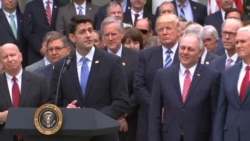The U.S. House of Representatives has passed a Republican bill to repeal and replace large parts of the nation’s health care law, giving President Donald Trump his first major legislative victory.
Six weeks after it was left for dead, the American Health Care Act, was approved Thursday by a narrow 217-213 margin, the first step toward fulfilling a nearly seven-year Republican promise to replace the Affordable Care Act, former President Barack Obama’s signature domestic achievement.
President Donald Trump tweeted that "the Republicans will be having a big press conference" at the White House after the vote.
The bill now goes to the Senate, where its fate is far from certain.
The bill was approved after it was amended Wednesday to add a modest $8 billion dollars to help people with pre-existing health conditions. After negotiating the terms of the amendment with President Trump at the White House, two prominent moderate Republicans, Fred Upton and Billy Long, reversed course and threw their support behind their party's health care bill.
Upton's reversal was particularly significant because he is a respected voice on health care issues and former chairman of the House Energy and Commerce Committee.
Several other Republican lawmakers subsequently followed suit, as Trump worked “the phone constantly" in attempts to garner more support, White House spokesman Sean Spicer said Wednesday.
Before the vote, Republican Congressman David Brat was asked if he was concerned millions of Americans could become financially insolvent if they lost medical coverage, as the non-partisan Congressional Budget Office (CBO) predicted would occur if an earlier version of the bill became law.
“I have major concerns about people going broke because this country has turned toward socialism away from free markets,” Brat said.
House minority leader Nancy Pelosi described the pre-vote debate as a “great civics lesson for America” at her weekly news briefing.
“They will find out their congressperson voted to gut key protections. Trumpcare destroys protections for pre-existing conditions" and “guts essential health benefits such as maternity care, prenatal, prescription drug and emergency coverage.”
During debate, Pelosi warned lawmakers who supported the bill they "have walked the plank from moderate to radical" and they would find it difficult to avoid unwanted attention in their home districts. "You will glow in the dark on this one," she said.
The Republican bill, the American Health Care Act, was passed despite expected opposition from every Democrat and more than a dozen Republicans. Numerous organizations representing patients, doctors and hospitals lobbied against the bill, as did the American Association of Retired People.
The debate centered on an amendment that would give states the ability to apply for exemptions from "essential" benefits in the current law, such as emergency and maternity care, and from uniform insurance rate requirements for people of the same age -- regardless of their health conditions.
"Let’s return power from Washington to the states," House Speaker Paul Ryan said during the debate.
These waivers would allow insurers to charge people with pre-existing illnesses significantly higher rates than heathy customers. Insurers would also be able to hike prices for older consumers to levels they desire and ignore the mandate that requires insurers to cover services considered essential under the current law.
It is not publicly known at this time how many states would seek waivers.
The Republican bill would eliminate tax penalties on people who don’t buy medical insurance and eliminate tax increases on higher earning people. It would cut Medicaid, a social health care program for low income people, and allow states to impose work requirements on Medicaid recipients.
The measure would transform subsidies partially based on income for millions of people buying insurance under the current law, the Affordable Care Act, into tax credits that rise with consumers’ ages.
The bill would retain the current law’s requirement that family policies cover grown children until age 26.
It would end federal payments to Planned Parenthood for one year, a victory for many anti-abortion Republicans.
The current law, commonly known as Obamacare, provides health insurance to about 20 million Americans.
The non-partisan CBO estimated last month the Republican bill would eliminate coverage for 24 million people over a decade. The CBO also concluded the bill’s subsidies would be less generous for many Americans, particularly lower income people and those under 65 but who still qualify for Medicare due to certain disabilities.
A CBO estimate for the cost of the latest version of the Republican bill was not ready before Thursday’s House approval.
Approval of the bill came one day before the House goes on an 11-day recess.











